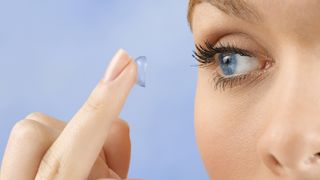Approximately 150 million Americans wear glasses, and this recent increase in the number of people ditching their spectacles in favor of the best contact lenses online (opens in new tab) has led the Contact Lens Institute (CLI) to issue new guidance (opens in new tab). The advice, dubbed the EASY Way Program, aims to ensure new users are wearing this type of eyewear safely and comfortably. Short for ‘Eyes, Awareness, Safety, and You’, the EASY Way program launched by CLI is designed to make the switch from glasses to contacts simple and safe. It does this by taking existing guidelines and turning them into three easy to recall steps. So if you’re thinking about making the switch, following these expert ‘wear and care’ tips will help to ensure your eyes stay healthy and happy.
How to care for contact lenses and wear them safely
In a study (opens in new tab) conducted by the CLI among US adults aged 18-54, 58% of respondents revealed they learn to use contacts through trial and error, with a further 28% admitting they won’t follow instructions if they’re too difficult to understand. That’s part of the reason why the CLI has published its new ‘Three steps to healthy, comfortable contact lens wear’ program. Here are the key points of advice: Think Clean: Thoroughly wash and dry your hands before and after touching your lenses or eyes. Contacts can be breeding grounds for bacteria that could lead to an eye infection, not to mention touching your eyes with unclean hands can also spread infections, such as the common cold and the coronavirus. Wash your hands with warm water and soap before you insert or remove contacts, paying attention to the palms, backs of hands, fingers and thumbs. We’d also recommend learning how to clean contact lenses (opens in new tab) properly to avoid bacteria and other build-up on the lenses. Fresher is Better: Speak to your eye care professional about how long you can wear your lenses for before you need to swap them out for a fresh pair, and only wear disposables once. When it comes to reusable contacts, use a new solution every time you cleaning your lenses and storage case, and replace your case every three months. Trust your Eye Doctor: If you have any questions or concerns about making the switch to contacts, speak to an eye doctor who is qualified to offer advice. Stan Rogaski, Executive Director of the Contact Lens Institute (CLI), said that, “The EASY Way is designed to present wear-and-care tips in a simplified, interesting and memorable manner that breaks through the noise… for a healthy, comfortable contact lens experience.”
Are foggy glasses really that much of a problem?
If you’re a glasses wearer, you’ve likely had the frustrating experience of having them fog up at the most inconvenient of times. Lens fogging is caused by condensation when water vapor from your breath, sweat, or humid air lands on the cold surface of your glasses, forming a film. It’s become especially common now that many of us are doing our part by wearing a face covering to slow the spread, whether that’s a reusable fabric face mask (opens in new tab) or a homemade face mask (opens in new tab). Lens fogging reduces your visibility and can be dangerous if you’re in the middle of operating machinery or driving a car, for example, and can cause you to become distracted when in shops or other indoor spaces, all of which increases your risk of accident and injury. The good news is that contacts typically aren’t affected by weather conditions, so they won’t fog up on you like glasses do. Just make sure you stay well hydrated in the winter to avoid dry eyes, and consider wearing contacts with UV protection in the summer months as well as wearing sunglasses with UV protection. We’d also recommend considering taking out the best vision insurance (opens in new tab) for your specific eye needs and to cover some of the costs of eye exams, prescription eyewear and more.
So are contact lenses safe to wear?
According to CDC guidelines (opens in new tab), contact lenses are safe for most people when used correctly. However, there are a small number of people who shouldn’t wear contact lenses (opens in new tab), including those who suffer from dry eyes. Stay safe and avoid infection and injury by ensuring you wear, clean, and store your lenses correctly. For those wondering can you sleep with contacts in (opens in new tab), the answer is no as you risk irritation and infection. In addition to the EASY Way steps, properly clean reusable lenses with a lens disinfecting solution, and keep them away from water - this means taking them out before swimming or showering. You’ll also want to clean the case too by regularly rinsing it with sterile lens solution before leaving it open to air dry. If you’re new to wearing contacts, the American Academy of Ophthalmology (opens in new tab) advises that you visit an eye doctor to get advice on which ones to buy, as many come with different levels of moisture and fit differently on the eye itself.
